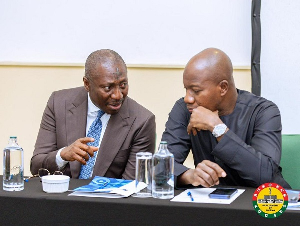The Ghana Revenue Authority (GRA) has assured the general public who were wrongfully charged e-levy that they are entitled to a refund.
According to the GRA, even though they are not responsible for the payment of refunds to customers directly, they have been assisting some affected members to obtain refunds from the charging entities.
Speaking on Eye on Port on the journey so far, with the implementation of the e-levy, a Senior Revenue Officer, who doubles as a Technical Committee Member of the e-levy, Mr. Opoku Asante Afriyie, called on the public who have been wrongfully charged to make official complaints to the charging entities comprising the mobile telecommunication networks and banks.
Mr. Amoako stated that their major challenges included wrongful charges to customers and how to handle the issue of refund. He urged customers to assert their rights and refrain from paying on-the-counter charges during mobile money transactions.
He explained that most of these wrongful charges are a result of the various charging institutions such as banks failing to update the E-levy platform with their customer's Ghana card information.
According to him, in July 2022, the implementation of the 2nd phase of the Electronic Transfer Levy commenced with the development of a system platform aimed at resolving the aforementioned challenge. He explained that the Electronic Levy Management System (ELMAS) has been developed which automatically computes and charges the e-levy applicable for transactions.
Contributing to the discussion, a Chief Revenue Officer of the Ghana Revenue Authority who also doubles as a member of the E-levy Technical Team, Isaac Kobina Amoako, stated that the Levy Act does not exempt entities but rather the type of transfers.
“The way the E-levy law was crafted, it did not exempt entities, it rather exempted the type of transfer. If the type of transfer is a mobile money transfer within the same network, it is taxable, if it is from one network to another network, it is also taxable, and that was how the law was crafted,” he said.
“There are some exemptions that are applicable within the E-levy, especially if you are sending it to yourself, you are exempted. There is also a daily minimum threshold of GH¢100 for mobile money transfers and GH¢20,000 for bank-to-bank transfers,” he explained.
Mr. Opoku Afriyie, further explained that the Electronic Transfer Levy Act exempts stakeholders within the value chain from E-levy taxation.
According to him, importers do not incur the charges of E-levy so long as the freight companies are registered with GRA.
“In the Act, we have what we call the specified merchant payment. When you are making payment to a freight company, so long as the freight company is registered with GRA for income tax or VAT, you will not pay E-levy as part of the transfer you are making for services they have rendered to you. As soon as you import the goods and they get into the country, you now have to rely on either a customer’s broker or what we call an agent to enable you to clear your goods. Once the declaration is made, you have to make payments for the duties and taxes that apply but then, the law specifically indicates that payment for taxes, fees, and services are exempted,” he said.
Business News of Tuesday, 9 April 2024
Source: Eye on Port













